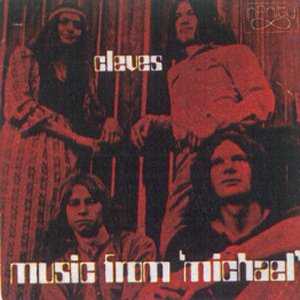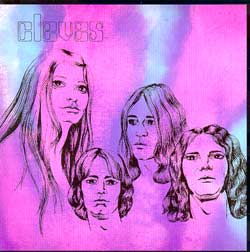1970
Music From Michael (Infinity)

| MILESAGO: Australasian Music & Popular Culture 1964-1975 | Groups & Solo Artists |
THE CLEVES
NZ / Sydney, 1964-1971
Rob Aicken (bass) 1965-?
Gaye Brown (vocals, organ)
Graham Brown (drums) 1964-1971
Ron Brown (guitar)
Ace Follington (drums) 1971-?
Milton Lane (rhythm guitar) 1964
Vince Meloney (guitar) 1971
History
The core members of The Cleves were New Zealand born Gaye Brown and her brothers Ron and Graham. All three studied music and formed their own group while in their teens. After adding local lad Milton Lane (rhythm guitar) they became The Clevedonaires ca. 1964. The band's name was taken from their home town of Clevedon, just south of Auckland. According to Bruce Sergent, Lane was replaced by Rob Aicken a few months later, although Vernon Joyson's listing for the group suggests that he came in later.
The Clevedonaires originally played "lightweight folksy music", covering acts like The Seekers, Donovan and the Byrds, and playing church halls and school dances around the South Auckland area. By 1965 they had toughened up their style and were covering tracks by The Who, The Small Faces and The Beatles. Gaye had now started playing organ, allowing Rob Aicken to switch to bass, and they started working the Auckland club circuit.
In 1966 Auckland promoter Benny Levin signed them to his Impact label. "How You Lied" / "Rooftops And Chimneys" came out in 1966, and "He's Ready" / "Lost Women" and "Funny How Love Can Be" / "Don't Ask Me What To Say" in 1967. To promote the singles, the band appeared on local TV shows The We Three Show and C'Mon. Their final Impact single, a cover of Donovan's "Sunny Goodge Street", backed by the Small Faces' "Up The Wooden Hills To Bedfordshire" was released in 1968, just before they relocated to Australia.
Now renamed The Cleves, they were one of several polished Sydney pop bands of the period (e.g. The Executives, The Affair, Aesop's Fables, The Clik) who featured tight harmonies, sophisticated arrangements and relatively light, pop-oriented repertoire. The Cleves' first Australian single appears to have been a promotional recording made for the Marionette Theatre of Australia's long-running children's production of The Tintookies. This enduringly popular children's show was based on Peter Scriven's 1946 book Little Fella Bindi and The Tintookies. (Scriven also created and performed the puppets for the Sixties TV series Sebastian The Fox and the 1968 short film The Painter). The single was issued on the Marionette label in 1968.
In 1969 the group signed with Festival and issued two singles, "Sticks and Stones" / "Don't Turn Your Back" (September 1969) and "You and Me" / "Cassie" (May 1970), plus two EPs, A Taste of Energy and Music from Michael on Festival's newly formed 'prog' subsidiary Infinity in 1970. Music From Michael was a sixteen-minute, ten-part suite recorded for the soundtrack of the "Michael" episode of the three-part Australian film Three to Go. "Michael", directed by Peter Weir, won the Grand Prix at the 1970 AFI Awards and it has recently been included on the DVD release of four short films by Peter Weir. (Another segment, "Toula" featured music by Graheme Bond and Rory O'Donohue). Along with the Bee Gees-like track "Don't Turn Your Back", the EP featured songs recorded for the soundtrack, segued together to form a thematic whole, which "combined certain elements of the British music hall tradition (as espoused by The Beatles) with a more esoteric pop flavour a la The Move".
By this time the band was heading in a more progressive musical direction, and they recorded their highly regarded LP, produced by Richard Batchens, in late 1970. Just before it was released (as part of Infinity's first batch of releases in January 1971) The Cleves backed Sydney DJ Donnie Sutherland on a bubblegum pop single with the outlandish title "Bonnie Bonnie Bonnie Na Na Kiss Him Goodbye" (b/w "I Don't Mind") which came out on Martin Erdman's Violet's Holiday label.
The LP, the highly collectable Cleves has been described by Ian McFarlane as "a prime example of where psychedelic pop gave way to a more progressive aesthetic". The album is dominated by "longer tracks, atmospheric organ/fuzzed guitar interplay and tight vocal harmonies (similar to UK bands on the Vertigo label like Cressida and Affinity)". The highlight was their impressive reading of the George Gershwin classic "Summertime". The album has since become one of the most collectible artefacts of Australia's progressive rock era.
"Gaye Brown's spirited vocals are in the manner of Dutch band Earth & Fire, highly regarded songstress Julie Driscoll and Affinity's Linda Hoyle. Tracks like 'Work Out' and 'Time Has Come' are based on a pop framework but are swelled by soaring fuzzed out leads, and Cressida-like keyboard passages. The highlights include an impressive rendering of the George Gershwin chestnut 'Summertime' (shades of Janis Joplin), then the dynamic 'There is a Place' and the more reflective 'For A Time'." -- Ian McFarlane
After the album came out The Cleves were joined for a short
time by guitarist Vince Meloney (guitar; ex-Billy
Thorpe and the Aztecs, Bee
Gees, Fanny Adams).
Not long
after, Ace Follington (ex-Chain,
Country Radio)
subsequently replaced Graham Brown on drums. In October 1971, The
Cleves moved to the UK (minus Meloney who had by then formed Flite with Leo De Castro) where
they became known as Bitch. Before breaking up the
band issued three singles, "Laughing", "Good
Time Coming" and "Wildcat". These were
apparently released on the Anchor
label, distributed by Warner Brothers in the USA. What became of the
group members after this time is not known.
Vicious Sloth Collectibles has re-released the Cleves
album on CD. Re-mastered from the original tapes, it also includes the
songs from the Music
From Michael EP as bonus tracks, plus original artwork and
liner notes.
Discography
Singles
as The Clevedonaires (NZ)
1966
"How You Lied" / "Rooftops And Chimneys" (Impact IR-1008)
1967
"He's Ready" / "Lost Women" (Impact IR-1019)
1967
"Funny How Love Can Be" / "Don't Ask Me What
To Say" (Impact IR-1027)
1968
"Sunny Goodge Street" / "Up The Wooden Hills To Bedfordshire" (Impact
IR-1036)
as The Cleves
1967
"Tintookies 2000 (The Push Theme)" / "Endings
Happy" (Marionette PRS-2189)
1969
"Sticks And Stones" / "Don't Turn Your Back" (Festival FK-3306)
1970
"You And Me" / "Cassie" (Festival FK-3489)
as Bitch (UK):
1971
"Laughing" / "House Where I Live" (Anchor)
1973
"Good Time Coming" / "At The Party" (Anchor K-16235)
1973
"Let A Little Love Come In" / "Minstrel Song" (Anchor)
EPs
1970
A Taste Of Energy (Infinity MX-36307)
[no image available]
1970
Music From Michael (Infinity)

LP
Jan. 1971
Cleves (Infinity SINL-934031)
Produced by Richard Batchens
Reissued by Vicious Sloth Collectibles
(VSC-003) CD

Side
1:
"Work Out"
There Is A Place"
"Keep Trying"
"Time Has Come"
Side
2:
"Summertime"
"Wait For A Moment"
"For A Time"
"Waterfall"
Bonus
tracks on CD:
"You And Me"
"Music From Michael"
References / Links
Ian McFarlane
Encyclopedia of Australian Rock & Pop (Allen & Unwin,
1999)
Vernon Joyson
Dreams, Fantasies & Nightmares: Australia
(Borderline Books, 1999)
Bruce Sergent
New Zealand Music of the 60s and 70s
http://www.sergent.com.au/clevedonaires.html
Vicious Sloth
Collectibles
http://www.vicioussloth.com.au/cleves2.htm